Science on the Swan Conference
Our annual Science on the Swan Conference showcases the very best of research and scientific endeavour in Western Australia, covering a mix of fundamental, biomedical, clinical, health and social science. It offers linkage opportunities for both industry and researchers, especially connecting early career to more senior and established health science and clinical leaders. It’s an opportunity to showcase the skills we have right here in Perth and help translate WA scientific efforts into real impacts to deliver better health outcomes to the wider community locally, nationally, and internationally.
Science on the Swan 2023
Partnering for Success
This year’s Science on the Swan (SOTS) conference highlighted the key emerging strategic research strategies and partnerships underpinning and influencing the Western Australian medical health and research sector. The conference was opened by the Hon Stephen Dawson MLC, who announced the new WA Health Data Linkage Strategy 2022-2024, which will modernise, simplify and improve access to health data. The Conference theme of “Partnering for Success,” highlighted the importance of collaboration in scientific advancement and breakthroughs. The opening session also saw the release of the WA Mental Health Research Strategy. In addition, Angela Kelly, Acting Director General of the WA Department of Health, gave an overview of the WA Medical Research Strategy 2023-2033, highlighting key areas of focus such as remote and regional health, Aboriginal health, digital health, precision health, prevention, and consumer engagement.
On day two of the conference, WA Mental Health Commissioner, Mr Lindsay Hale, invited over 60 representatives from across the sector to workshop the implementation of the newly released Mental Health Strategy.
In addition to the release of new state-wide strategies, SOTS 2023 featured many inspiring talks including keynote presentations from Adjunct Professor Darryl O’Donnell (Chair, NHMRC Consumer Statement Advisory Committee), Professor Jonathan Carapetis (Executive Director, Telethon Kids Institute), Professor Christos Pantelis (Chair of Neuropsychiatry, University of Melbourne), Associate Professor Jennifer Stone (School of Population and Global Health, UWA), Professor Timothy Carey (Director WACHS-Curtin Alliance and Associate Professor Glenn Pearson (Director First Nations Strategy and Leadership, Telethon Kids Institute.
The conference featured 12 sessions and two satellite events run across three days, with more than 380 registrants in attendance. The sessions focused on the WA Health Future Health Research and Innovation themes of Aboriginal and Rural Health, Burden of Disease, COVID and long COVID, and Mental Health, in addition to discussions on successful healthcare partnerships; consumer involvement, women’s health and state-wide projects.
Consumer and Community Involvement (CCI) played a central role in SOTS 2023 this year with WAHTN’s CCIProgram playing a pivotal role in the organising, planning, and hosting of a number of sessions. This included: the ‘Partnering with Consumers for Success’ Consumer and Community Involvement Breakfast; the launch of the WA CCI Community of Practice, a collaborative community of professionals and colleagues involved in supporting consumers and researchers to involve people with lived experience in research in WA (chaired by WAHTN, this state based CCI Community of Practice is the first of its kind nationally); and a CCI in Research oral session with a keynote presentation from Adjunct Prof Darryl O’Donnell, NHMRC Consumer and Community Advisory Group member, Chair NHMRC Consumer Statement Advisory Committee, and CEO, Australian Federation of AIDS Organisations, followed by four short presentations of research projects involving people with lived experience and a combined Panel Discussion.
The Early Stage Biomedical and Health Innovation Showcase satellite event hosted by Biodesign Australia and the City of Perth saw eight early-stage innovation presentations as well as updates on the WA biomedical and health innovation ecosystem. Minister Stephen Dawson announced the partnership between The University of Western Australia and the Bridgewest Group, (the parent company of NovaCina and LumaCina).
The WA Department of Health Office of Medical Research and Innovation (OMRI) collaborated with WAHTN partner, The University of Western Australia (UWA) to deliver a grant writing workshop for allied health, nursing and midwifery researchers looking to develop their skills in writing and applying for Future Health Research and Innovation (FHRI) Fund research grants. Following the success of the workshop held on 9 March, a second workshop was held as a satellite event on day three of SOTS 2023. The aim of the workshop is to break down the process of applying for grant funding and provide tips and advice on how to present a strong case that will set applications apart from others. Speakers at the two workshops included Dr Michael Banazis, Professor Romola Bucks (UWA), Professor Anne Hill (UWA), Dr Amy Page (UWA), Dr Evenda Dench (UWA), Dr Pamela Laird (Telethon Kids Institute/Child and Adolescent Health Service), Professor Peter McEvoy (Curtin University) and Debra Langridge (Consumer and Community Involvement Program).
Sessions from the workshop on 9 March were recorded and can be accessed here.
Photographic highlights of the conference can be viewed in the Photo Gallery
Science on the Swan 2022
Creating Impact through Healthcare Innovation and Commercialisation
Science on the Swan (SOTS) 2022 has successfully concluded after three days of inspirational talks, shared learnings and useful networking around the theme of Creating Impact through Healthcare Innovation and Commercialisation. Officially opened by Minister Stephen Dawson, this was the seventh SOTS conference hosted by the Western Australian Health Translation Network.
During the opening speech, Minister Stephen Dawson also shared exciting news for the WA Health and Medical sector as he announced the collaboration between Texas Medical Center (TMC), the largest medical city in the world, and Biodesign Australia, which is administered by The University of Western Australia. This partnership is a huge step in strengthening the State’s health and medical science sector promoting research, innovation and commercialisation resulting in greater investment, more local jobs and ultimately, improvements in health and wellbeing. He further announced that WA will be hosting TMC at the AusBiotech Conference 2022 which is being held in Perth in October this year.
Over three days, we saw more than 60 presentations from researchers and clinicians across a wide range of expertise, along with panel discussions, posters and many networking opportunities. The program covered a diverse range of topics including opportunities and challenges faced by WA innovators; patent and commercialisation frameworks; consumer and community involvement in innovation, as well as insightful discussions on how we could work together as a sector to enable optimisation of healthcare environment in WA. Additionally, the SOTS conference brought us international biomedical innovations with guest speakers including Dr Eyal Zimlichman, MD (Sheba Medical Centre, Israel), Dr Kate Hilyard (UK Vaccine Taskforce) and Prof Michael Wallach (SPARK Oceania).
The keynote speaker for SOTS 2022 was one of our very own WA stars, Dr Craig Challen, 2019 Australian of the Year who shared an inspiring story on how he and Dr Richard Harris led an international crew to save a soccer team of twelve boys and their coach in the 2018 Thai Cave Rescue. This was the ultimate case study in on-the-spot innovation by brilliant people and implementation of techniques not previously trialled with one sole purpose – to save those trapped in the cave. We were also delighted to welcome Dr Ruben Meerman, the surfing scientist, who shared his fascinating discovery on the periodic table and how breathing helps lose weight.
Overall, it was a successful event and really highlighted the critical role of WAHTN as we brought together WA’s universities, medical research institutes, public and private hospitals, and the WA Department of Health, to embrace and accelerate research translation. Congratulations and thank you to everyone who presented, supported, and attended the Science on the Swan 2022 Conference.
Science on the Swan 2021
Embedding Research and Innovation in Health Care with COVID-19 Insights
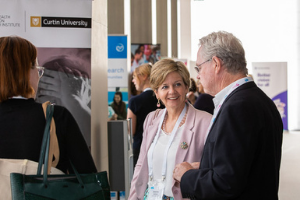
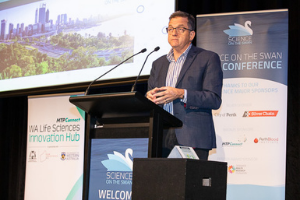
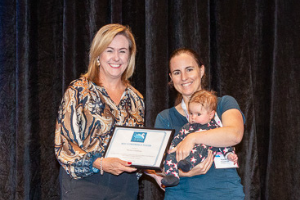
After the 2020 conference was cancelled due to COVID-19, we were pleased to be able to gather in person for Science on the Swan 2021 (as well as offering virtual attendance).
The program featured more than 60 presentations from researchers and clinicians across a wide range of expertise, along with panel discussions, posters and plenty of networking opportunities. The first two days included sessions chaired by PathWest; the East, North and South Metropolitan Health Services; Child and Adolescent Health Service; WA Country Health Service; and private hospitals; covering a wide range of research areas. They were followed by one day dedicated to the Western Australian response to COVID-19, which included presentations from the State’s Chief and Deputy Chief Health Officers, Chief Science Officer, and Health Department Director General, and a keynote address from Professor Jeremy Nicholson of the Australian National Phenome Centre on ‘The Secret Life of SARS-COV-2’.
Offical conference photos can be viewed in our Facebook album.
Selected sessions from the third day of the conference (which focused on COVID-19) can be viewed via the links below.
- WA Response to COVID-19 (with Dr David Russell-Weisz, Dr Andrew Robertson, Dr Robyn Lawrence and Prof Peter Klinken AC)
- Department of Health (Dr Darren Gibson)
- WAHTN Experience (Prof Gary Geelhoed)
- Immunological Response to COVID-19 (Dr Michael O’Sullivan)
- Thrombosis and COVID-19 (Prof Ross Baker)
- Silver Chain Group, The Future of Care is in the Home. More than 125 Years in the Making (A/Prof Anna Barker)
- Canary in the Coalmine: Initiatives to Keep WA Mining Safe During COVID-19 (Prof Chris Reid)
- Consumer & Carer ‘Flipped’ Research in Mental Health (Prof Sean Hood)
- From Running Clinical Trials to Answering Community Questions (Prof Jonathan Carapetis)
- REMAP-CAP: A Bayesian Adaptive Trial Identifying Treatments for COVID-19 (Prof Steve Webb)
- Behaviour and Mental Health Before and After the Onset of the COVID-19 Epidemic (Prof Alan James)
- The WA Community’s Drive to be Involved in Research (Ms Deb Langridge)
Science on the Swan 2019
Neuroscience & the Senses – Healthy Ageing across the Life Course
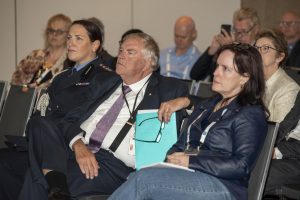
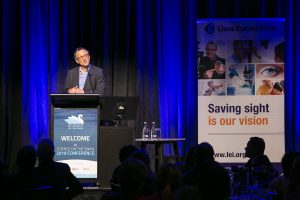
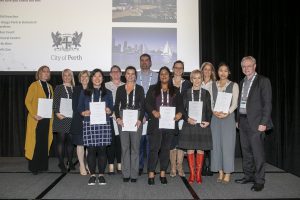
Science on the Swan 2019 was the 5th conference hosted by the West Australian Health Translation Network (WAHTN) and the first co-chaired by the Ear Science Institute Australia, the Perron Institute for Neurological and Translational Science and the Lions Eye Institute. The program covered a large range of topics including hearing loss, Meniere’s disease, eye disease, MedTech (wearable and implantable), phenotyping and personalised medicine, stroke treatment and recovery, dementia, Alzheimer’s disease, bipolar disorder and healthy ageing.
The keynote speaker for the 2019 Conference was the very popular BBC science presenter and creator of the 5:2 Diet, Dr Michael Mosley, who was introduced by Nobel Laureate, Professor Barry Marshall. Dr Mosley spoke on How to keep your Brain Young – the secrets to successful ageing. The take home message, in a nutshell, was to eat well (i.e. the Nordic or Mediterranean diets), do regular strength and high intensity training and use your brain (use it, or lose it!).
Read our Science on the Swan 2019 Wrap Up or view our feature in the West Australian magazine.
Science on the Swan 2018
Science, Health & Community – from Mechanisms to Models of Care
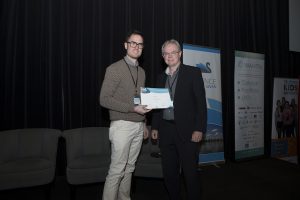
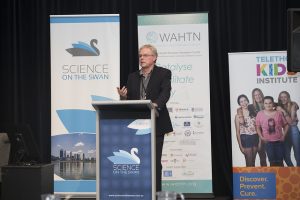
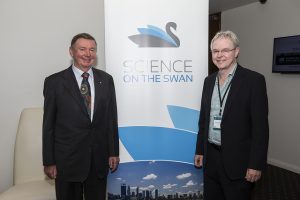
Science on the Swan 2018 focused on the implications of managing health and disease across the broad community. It is increasingly recognised that chronic diseases in adults (such as diabetes, cardiovascular disease, lung disease and mental health conditions) begin earlier in life. Tackling these issues requires a holistic and multifaceted approach. It was also recognised that the healthcare burden for these chronic diseases is aggravated by the demon of distance. Regional and remote Australians and Aboriginal and Torres Strait Islander Australians bear a greater burden just by being physically removed from major centres of care.
Three key areas were highlighted in the 2018 Conference:
- The life course of chronic disease
- Brain development and mental health
- Aboriginal health and wellbeing
The Conference program also covered topics such as the mechanisms which underpin the development and progression of chronic disease and mental health conditions, the emerging models of care which optimise the involvement of individuals and community in the management of health problems. The impact of environment, physical activity and obesity was also explored. Finally, the Conference showcased the latest advances in Aboriginal health and well-being, looking at the significant benefits arising from the co-design of health promotion and health management programs by health professionals and Aboriginal communities.
2017 Science on the Swan
One Health

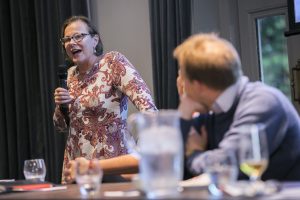

Did you know that 75% of newly emerging diseases in the last 30 years are the result of zoonotic (human – nonhuman) transmission? Population growth, climate change, lifestyle shifts and rapid transportation profoundly affect global disease profiles and acquisition risk. One Health was a Conference interested in an integrated effort of multiple disciplines to understand how these factors interact to increase the risk of emergent diseases on a global scale.
The Conference program covered topics including emergent pandemic disease threat, bacterial and fungal infections, cultural beliefs and public health solutions, personalised treatment of infectious disease, stem cell therapies, biomedical technology innovation and other emerging technologies, regenerative medicine, The Omics revolution and large data mining of amalgamated databases.
Science on the Swan 2016
Cutting Edge
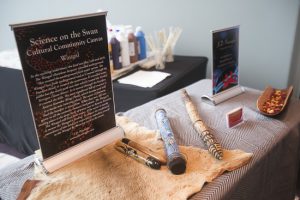
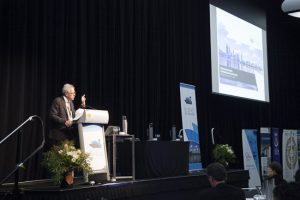
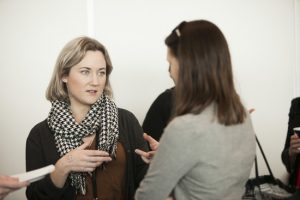
Science on the Swan 2016 had 13 international speakers and many of Australia’s top researchers presenting. The Conference brought together experts from multiple disciplines who spoke on their latest discoveries and advances in health and biotechnology, including presentations from:
- Atul Butte – Director, Institute for Computational Health Sciences, University of California
- Zoltan Takats – Professor of Analytical Chemistry, Imperial College London
- Andrew Walshe – Director of High Performance, Red Bull
- Anne Kelso – CEO, National Heath & Medical Research Council
- David Hansen – CEO, Australian e-Health Research Centre, CSIRO Health & Biosecurity
Accompanying the Conference was a Symposium event exploring big data, precision medicine, imaging, bio-engineering, 3D printing, new technologies and Omics.
Science on the Swan 2015
Hot Topics in Life Course and Development
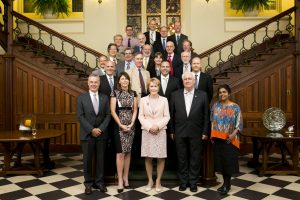
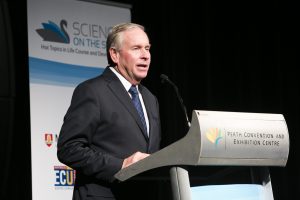
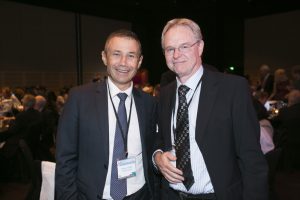
Science on the Swan 2015 covered a variety of topics including the human life cycle – from pre-pregnancy, to the developing brain (and relating to conditions such as ADHD, Autism and early school performance), our microbiome and bacteria which co-habit our bodies, as well as how and why metabolic disease, diabetes and obesity develop and how they might be prevented.
